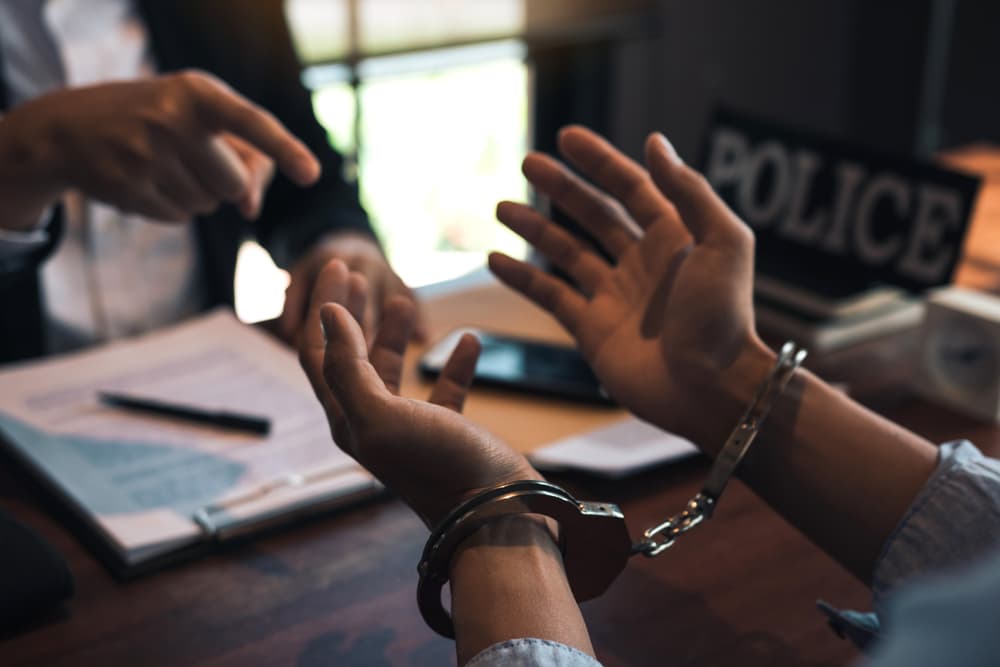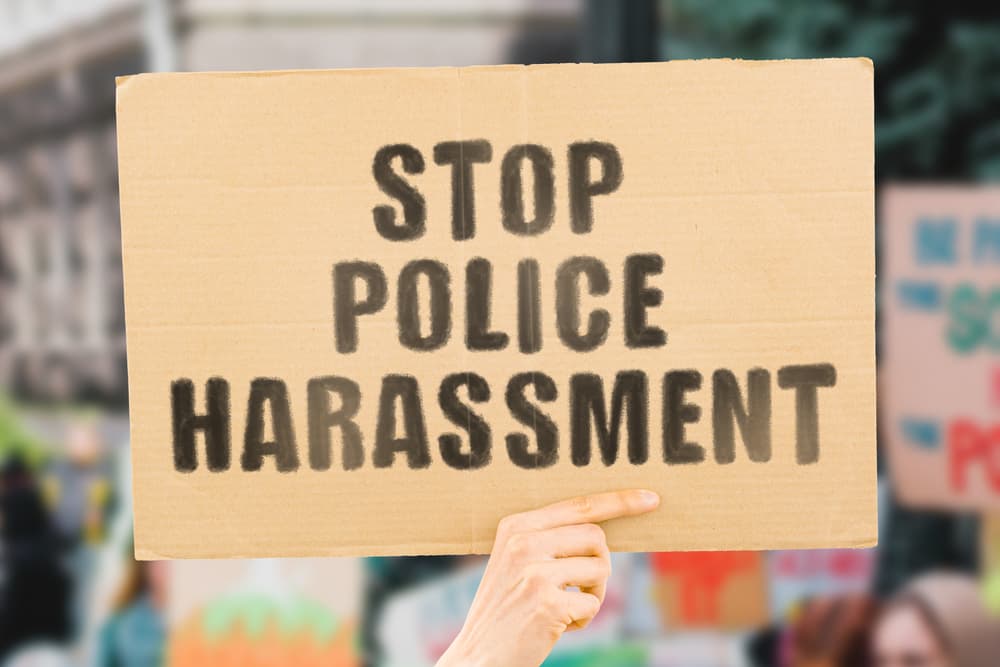For a police stop in Orange County, California, to be lawful, a police officer must ordinarily have reasonable suspicion or probable cause to initiate the stop. For example, the driver may have committed a moving violation or erratically operated their vehicle.
However, in some cases, police officers violate proper procedures and initiate unlawful traffic stops. If this happens, and you are later charged with a crime, you can raise the unlawful traffic stop as a defense and move to exclude any subsequent evidence. This can significantly damage the prosecution’s case against you. Alternatively, your lawyer can use the unlawful traffic stop as a bargaining tool during plea deal negotiations in your case.
A skilled Orange County criminal defense attorney can review your circumstances with you, determine your options, and pursue the best course of action for your case.
Types of Criminal Charges that Can Result from a Police Stop in Orange County

In Orange County, California, police stops can lead to criminal charges, depending on what the officers find or observe during the encounter.
Here are the most common criminal charges that often arise from police stops:
- Driving Under the Influence (DUI) – One of the most frequent charges resulting from traffic stops is driving under the influence of alcohol or drugs. If an officer observes erratic driving behavior, they may stop the vehicle to investigate further. If the driver fails a field sobriety test or breathalyzer test, they can be charged with a DUI, which carries severe penalties, including fines, license suspension, and possible jail time, upon conviction.
- Drug Possession – During a traffic stop, if officers find illegal substances in the vehicle or on the person, the individual can be charged with drug possession. This includes marijuana (beyond legal limits), cocaine, methamphetamine, or prescription drugs without a valid prescription. Possession charges can range from misdemeanors to felonies based on the type and amount of drug found.
- Illegal Firearms Possession – If a person is found carrying a firearm without the proper permits – or if the firearm is illegal (e.g., unregistered or modified) – they can face criminal charges. Firearm violations are taken very seriously and can result in significant fines and imprisonment upon conviction.
- Outstanding Warrants – During a traffic stop, if an officer runs a background check and discovers that the individual has outstanding warrants for their arrest, they will be taken into custody. Warrants can be issued for various reasons, including missed court dates, unpaid fines, or previous charges.
- Traffic Violations – While not always leading to criminal charges, severe traffic violations can escalate to criminal offenses. Examples include reckless driving, street racing, or driving with a suspended or revoked license. Such violations can result in heavy penalties, including jail time for repeat offenders.
- Theft and Burglary – In some cases, police can uncover stolen property or goods that link the individual to recent thefts or burglaries. If an officer finds stolen items during a stop, the person can be charged with theft or possession of stolen property.
- Assault and Battery – If a traffic stop results from a reported altercation or if an individual becomes aggressive towards the police during the stop, they can be charged with assault or battery. Physical aggression towards officers and others can lead to serious charges and severe consequences.
What Makes a Police Stop Unlawful in Orange County?
In Orange County, California, a police stop can be considered unlawful if it violates constitutional rights or state laws that protect individuals from unreasonable searches and seizures.
Here are the key factors that determine the lawfulness of a police stop:
- Reasonable Suspicion – For a police stop to be lawful, officers must have reasonable suspicion that a person is involved in criminal activity. This means they need specific and articulable facts to justify the stop. A hunch or vague suspicion isn’t enough. For instance, if someone is seen acting suspiciously in an area known for drug activity, officers may have reasonable suspicion to stop them. However, if the stop is based solely on the person’s race or appearance, it would violate the law.
- Traffic Stops – When it comes to traffic stops, police must have a legitimate reason, such as a traffic violation or a defective vehicle. The court may consider the stop unlawful if the police pull over a driver without any observable violation.
- Searches During a Stop – During a lawful stop, police may pat down a suspect for weapons if they have reasonable belief the person is armed and dangerous. However, they can’t search the vehicle or personal belongings without either probable cause, the suspect’s consent, or a warrant. For example, if an officer stops someone for running a red light, they can’t search the car’s trunk unless they see or smell something that gives them probable cause, like visible contraband or the odor of drugs.
- Duration of the Stop – The stop must be reasonably brief. Officers can’t detain a person longer than necessary to address the reason for the stop. Prolonging the detention without a valid reason, such as waiting for a drug-sniffing dog when there’s no immediate suspicion of drugs, can make the stop unlawful.
- Miranda Rights – If, during the stop, an officer decides to take a person into custody and interrogate them, they must read the Miranda rights. Failing to do so before questioning can lead to any obtained statements being inadmissible in court.
Possible Ways of Challenging an Unlawful Police Stop

Challenging an unlawful police stop in Orange County, California, involves several legal strategies to protect one’s rights and potentially dismiss any charges resulting from the stop. Here are the main ways to challenge an unlawful police stop:
- Filing a Motion to Suppress Evidence – The most common way to challenge an unlawful stop is by filing a motion to suppress evidence. If the stop was conducted without reasonable suspicion or probable cause, any evidence obtained during the stop can be considered inadmissible in court. This means that if drugs, weapons, or other incriminating items were found, they could not be used against the individual during the trial. The accused individual’s (defendant’s) attorney will argue that the evidence is the fruit of the poisonous tree – a legal doctrine that excludes evidence obtained through illegal means.
- Proving Lack of Reasonable Suspicion – To challenge the stop itself, the defense must show that the police did not have specific and articulable facts to justify the stop. This involves scrutinizing the officers’ reports and body cam footage (if available) to demonstrate that the stop was based on a mere hunch or bias rather than legitimate suspicion of criminal activity. For example, if an officer pulled someone over solely because they were driving in a certain neighborhood, the stop may be deemed unlawful.
- Challenging the Duration of the Stop – The defense can argue that the stop was unreasonably prolonged beyond the time necessary to address the initial reason for the stop. If officers detained the individual longer than necessary without new reasonable suspicion or probable cause emerging during the stop, any evidence found after the unreasonable delay may be suppressed.
- Questioning the Validity of Consent – If the police obtained consent to search the vehicle or person, the defense can challenge whether the consent was given voluntarily and without coercion. If it can be shown that the individual was pressured or intimidated into consenting, the search and its results may be deemed invalid.
- Examining Officer Conduct – Any misconduct or procedural violations by the police during the stop can also be grounds for challenging its legality. This includes excessive force, failing to read Miranda rights when required, or conducting a search without proper legal basis. Evidence of such misconduct can weaken the prosecution’s case and potentially lead to the dismissal of charges.
- Appealing to Higher Courts – If initial challenges are unsuccessful, the defendant can appeal the court’s decision to higher courts. Appeals can argue that the lower court erred in its judgment regarding the legality of the stop or the admissibility of evidence.
By employing these strategies, individuals and their attorneys can effectively challenge unlawful police stops in Orange County, ensuring that their rights are upheld and any unjust charges are contested.
How Can Challenging an Unlawful Police Stop be Helpful to Your Case?

Challenging an unlawful police stop can significantly strengthen your criminal defense in several crucial ways. Here’s how addressing the legality of a police stop can help protect your rights and improve your chances in court:
- Suppression of Evidence – If the police stop was unlawful, any evidence gathered during the stop can be suppressed. This means that the prosecution cannot use it against you in court. For example, if drugs or weapons were found during an illegal search, they would be inadmissible. Without this key evidence, the prosecution’s case often becomes much weaker, potentially leading to a dismissal or reduction of charges.
- Highlighting Police Misconduct – Challenging the stop can also bring to light any misconduct or procedural errors by police officers. If officers violated your rights during the stop, this can undermine their testimony's credibility and the entire investigation's legitimacy. Demonstrating that the police acted improperly can create doubt about the prosecution’s case and lead to a more favorable outcome for you.
- Protecting Constitutional Rights – Successfully challenging an unlawful stop reinforces your Fourth Amendment rights, which protect against unreasonable searches and seizures. By standing up against an unlawful stop, you not only defend your own rights but also help maintain the integrity of constitutional protections for everyone. Courts take these rights seriously, and any violation can significantly affect your case.
- Weakening the Prosecution’s Case – Without evidence obtained from the stop, the prosecution may struggle to prove their case beyond a reasonable doubt. For instance, if the primary evidence against you results from the unlawful stop, its exclusion can leave the prosecution with little or no case. This may lead to your charges being dropped or reduced.
- Psychological Advantage – Challenging an unlawful police stop demonstrates to the court that you are vigilant about your rights and prepared to fight any injustices in your case. This can create a positive impression and influence how the judge views your defense strategy.
- Leveraging Plea Bargains – When evidence is suppressed, the prosecution may be more willing to negotiate a favorable plea bargain. Knowing that their case is weaker, they may offer a deal that includes reduced charges or lighter sentencing. This can be a strategic advantage, giving you more control over the outcome.
What is a Plea Bargain, and How Can It Help Your Case?

A plea bargain is an agreement between the defendant and the prosecution in a criminal case where the defendant agrees to plead guilty to a lesser charge – or to one of multiple charges – in exchange for certain concessions from the prosecution. These concessions may include a reduced sentence, dismissal of other charges, or a recommendation for leniency to the judge.
Plea bargains can significantly benefit defendants in several ways:
- Reduced Charges – By accepting a plea bargain, a defendant may plead guilty to a less severe charge than originally faced. For instance, instead of being convicted of a felony, the defendant may plead guilty to a misdemeanor, which typically carries lighter penalties and has fewer long-term consequences on things like employment opportunities.
- Lighter Sentencing – A plea bargain can result in a more lenient sentence than what might be handed down if the defendant were found guilty at trial. For example, a plea agreement can reduce potential jail time, probation length, or fines. This can be especially beneficial for defendants facing significant prison time.
- Faster Resolution – Trials can be lengthy, stressful, and costly. A plea bargain allows for a quicker resolution to the case, sparing the defendant the time and expense of a trial. This can be particularly advantageous for those who want to move on with their lives as soon as possible.
- Certainty of Outcome – Trials can be unpredictable, with no guaranteed outcome. By accepting a plea deal, the defendant gains a certain degree of control over their fate, knowing exactly what the charges and penalties will be. This can reduce anxiety and uncertainty.
- Lesser Effect on Record – Pleading guilty to a lesser charge can have a less significant effect on a defendant’s criminal record. This can damage prospects for future employment, housing, and other aspects of life where a clean record is important.
- Avoiding Additional Charges – In some cases, the prosecution may agree to drop other charges as part of the plea deal. This can prevent the defendant from facing multiple convictions and the associated penalties.
Contact an Experienced Criminal Defense Attorney Today
If you are the victim of an unlawful police stop, a skilled criminal defense attorney in Orange County can represent you throughout your case.
Your attorney at the Chudnovsky Law can raise a strong legal defense at trial or negotiate a fair plea deal on your behalf. Your lawyer will do everything they can to obtain the best possible result in your criminal case.